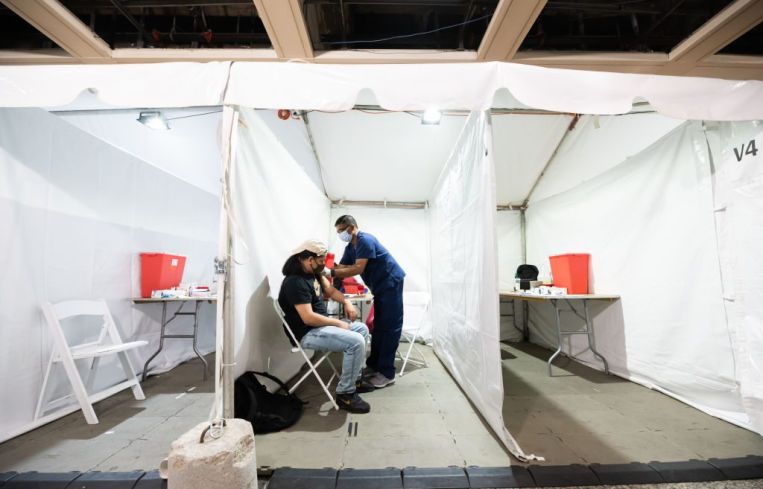City Worker Vaccine Mandate Has Private Employers in NYC Scrambling
By Aaron Short July 28, 2021 11:26 am
reprints
A deluge of vaccine and testing orders from multiple levels of government this week is forcing New York’s private employers to wrestle with adopting new policies to maintain a healthy workplace without violating worker rights.
Contractors, building trades leaders, and union officials conferred with real estate leaders on Tuesday to determine the best course of action for nudging skeptical employees to get vaccinated and launch testing programs, sources told Commercial Observer.
Employers had been reluctant to jump ahead of government guidelines on vaccinations before setting their own policies. Some companies have established voluntary incentives, like asking for proof of vaccination and face masks to be worn on-site or forbidding business travel until COVID cases fall. Many have relied on the honor system to figure out which of their workers have been vaccinated. Others, such as the Durst Organization, are requiring all employees to be vaccinated by early September, with a handful of religious and medical exemptions.
But, Mayor Bill de Blasio’s order Monday requiring municipal workers to get their doses or receive weekly COVID tests, and President Joe Biden’s announcement that he would consider a similar policy, is persuading many private employers to move ahead with their own requirements.
“This is a public health problem and it’s the government that ultimately has to deal with it, with a public mandate,” said Kathryn Wylde, president and CEO of the Partnership for New York City. “Employers are doing everything they can — including, where possible, vaccine mandates — but there’s only so far they can go without disrupting their workplace and discouraging people from coming back.”
Imposing vaccine requirements in the private sector can be just as challenging as in the public sector.
Industry and labor officials said they shared the goal of boosting the city’s vaccination levels after COVID-19 cases nearly doubled in the past week, thanks to the highly transmissible Delta variant. But, employers could face more liability over COVID vaccines since the U.S. Food and Drug Administration authorized the drugs on an expedited approval.
And labor leaders stressed that any policy involving mandating vaccines is subject to collective bargaining agreements, with some of those discussions happening through the Realty Advisory Board on Labor Relations, sources said.
“We encourage all New Yorkers to get vaccinated, as it’s the quickest way to turn the corner on the COVID-19 pandemic, but also recognize the importance of personal choice and the need to make appropriate accommodations, while always maintaining and protecting the health and safety of working people,” Gary LaBarbera, president of the Building and Construction Trades Council of Greater New York, said in a statement.
So far, 71 percent of New York adults have received at least one dose of a vaccine, and 65 percent are fully vaccinated (the figures drop to 59 percent and 54 percent, respectively, when you include all ages). Public-sector workers have far lower rates — only 43 percent of cops and 42 percent of corrections workers had vaccinations.
But unionized workers who work in hotels, residential, and commercial buildings may be less reluctant to get doses. Nearly 70 percent of building workers polled by union SEIU 32BJ’s health fund in June said they were vaccinated, and another 15 percent planned on getting shots.
Kyle Bragg, president of SEIU 32BJ — which represents doormen, janitors and security officers — credits the union’s educational campaign about the efficacy of vaccines and its negotiations with employers for paid time off to get their shots in helping to boost their vaccination rate.
“Throughout the pandemic, we have worked closely and productively with employers and industry leaders to develop protocols and protections to keep workers and those they serve safe,” Bragg said. “We expect that partnership to continue as conditions evolve.”



